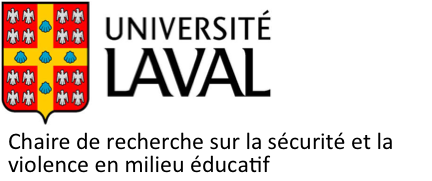International Journal on School Climate and Violence Prevention / Journal International sur le Climat Scolaire et la Prévention de la Violence




Presentation
The International Journal of Violence and Schools (IJVS) is taking a new turn. From now on it is a joint publication from the International Observatory of Violence in Schools, the National School Climate Center (New-York), the SWAPv (Student Wellbeing and Prevention of Violence) - Flinders University -Adelaide, and the Chaire de recherche « Sécurité et Violence en Milieu Educatif - Laval University Quebec.
It changes name to correspond better to nowadays’ preoccupation about the school environment and school climate and will be titled from now on as the INTERNATIONAL JOURNAL OF SCHOOL CLIMATE AND VIOLENCE PREVENTION.
The International Journal on School Climate and Violence Prevention is a blind- and peer-reviewed scientific journal founded by the International Observatory of Violence in Schools in 2005. The IJVS seeks to promote progress in knowledge on school climate and the prevention of violence in schools towards a greater well-being of students and staff.
The journal’s scientific committee includes researchers from different disciplines and from 10 different countries. It will publish two issues per year although extra thematic issues might be published.
Our mission
This journal aims to encourage international research on violence, an effective prevention of violence and an improvement of effort on school climate.
Violence here is understood as being in all its forms: physical brutality and bullying, juvenile delinquency or violence perpetrated by adults. It can affect children, teenagers and members of staff alike. Those responsible may be members of the school or people from outside.
School climate refers to the quality and character of school life. It is shaped based on patterns of students’, parents’, school personnel and community members experiences of school life and reflects norms, goals, values, interpersonal relationships, teaching and learning practices and organizational structures. An effective school climate improvement process is an international, strategic, collaborative, data-driven, transparent and democratically informed process of learning and working together to create even safer, more supportive, engaging and healthy climates for learning that support school – and life – success.
The journal recognizes and honors an ecologically informed perspective of children and school community. School climate improvement, violence and violence prevention efforts will also be considered in a wider environment than that of schools alone: issues devoted to themes such as juvenile delinquency or violence within the family, for example, may also be published.
Papers in the journal will include commentaries as well as research: case studies, ethnographic, correlational, cross sectional, Multilevel models/hierarchical linear models and randomized controlled experimental studies.
The international, comparative dimension is one of the outstanding features of the Journal.
Editors
Pr. Rami Benbenishty - Bar Ilan University - Israel
Pr. Catherine Blaya - University Nice Sophia Antipolis - France
Pr. Jonathan Cohen - National School Climate Center - U.S.A.
Pr. Eric Debarbieux - University Paris Est Créteil - UPEC - France
Pr. Dorothy Espelage - University of Illinois - U.S.A.
Dr. Benjamin Moignard - University Paris Est Créteil - UPEC - France
Pr. Rosario Ortega Ruiz - University of Cordoba - Spain
Pr. Azucena Ramos Herrera - University of Guadalajara - Mexico
Pr. Egide Royer - Université Laval - Quebec
Pr. Grace Skrzypiec - Flinders University of South Australia - Australia
Pr. Phillip Slee - Flinders University of South Australia - Australia
Dr. Terry Carol Spitzer - Universidad Autonoma de Chapingo - Mexico
Pr. Georges Steffgen - University of Luxembourg - Luxembourg
Dr Mitsuru Taki (PI) - National Institute of Educational Policy Research - Japan
Pr. Stuart Twemlow - Houston University - U.S.A.
Pr. Mao Yaqing - Beijing Normal University - China
Pr. Marvin W. Berkowitz - University of Missouri-St-Louis - USA
It changes name to correspond better to nowadays’ preoccupation about the school environment and school climate and will be titled from now on as the INTERNATIONAL JOURNAL OF SCHOOL CLIMATE AND VIOLENCE PREVENTION.
The International Journal on School Climate and Violence Prevention is a blind- and peer-reviewed scientific journal founded by the International Observatory of Violence in Schools in 2005. The IJVS seeks to promote progress in knowledge on school climate and the prevention of violence in schools towards a greater well-being of students and staff.
The journal’s scientific committee includes researchers from different disciplines and from 10 different countries. It will publish two issues per year although extra thematic issues might be published.
Our mission
This journal aims to encourage international research on violence, an effective prevention of violence and an improvement of effort on school climate.
Violence here is understood as being in all its forms: physical brutality and bullying, juvenile delinquency or violence perpetrated by adults. It can affect children, teenagers and members of staff alike. Those responsible may be members of the school or people from outside.
School climate refers to the quality and character of school life. It is shaped based on patterns of students’, parents’, school personnel and community members experiences of school life and reflects norms, goals, values, interpersonal relationships, teaching and learning practices and organizational structures. An effective school climate improvement process is an international, strategic, collaborative, data-driven, transparent and democratically informed process of learning and working together to create even safer, more supportive, engaging and healthy climates for learning that support school – and life – success.
The journal recognizes and honors an ecologically informed perspective of children and school community. School climate improvement, violence and violence prevention efforts will also be considered in a wider environment than that of schools alone: issues devoted to themes such as juvenile delinquency or violence within the family, for example, may also be published.
Papers in the journal will include commentaries as well as research: case studies, ethnographic, correlational, cross sectional, Multilevel models/hierarchical linear models and randomized controlled experimental studies.
The international, comparative dimension is one of the outstanding features of the Journal.
Editors
Pr. Catherine Blaya - University Nice Sophia Antipolis - France 
Pr. Jonathan Cohen - National School Climate Center - U.S.A.
Pr. Grace Skrzypiec - Flinders University of South Australia - Australia
Pr. Rosario Ortega Ruiz - University of Cordoba - Spain
Pr. Jonathan Cohen - National School Climate Center - U.S.A.
Pr. Grace Skrzypiec - Flinders University of South Australia - Australia
Pr. Rosario Ortega Ruiz - University of Cordoba - Spain
Editorial Board
Pr. Ron Avi Astor - University of Southern California - U.S.A.
Pr. Rami Benbenishty - Bar Ilan University - Israel
Pr. Catherine Blaya - University Nice Sophia Antipolis - France
Pr. Jonathan Cohen - National School Climate Center - U.S.A.
Pr. Eric Debarbieux - University Paris Est Créteil - UPEC - France
Pr. Dorothy Espelage - University of Illinois - U.S.A.
Dr. Benjamin Moignard - University Paris Est Créteil - UPEC - France
Pr. Rosario Ortega Ruiz - University of Cordoba - Spain
Pr. Azucena Ramos Herrera - University of Guadalajara - Mexico
Pr. Egide Royer - Université Laval - Quebec
Pr. Grace Skrzypiec - Flinders University of South Australia - Australia
Pr. Phillip Slee - Flinders University of South Australia - Australia
Dr. Terry Carol Spitzer - Universidad Autonoma de Chapingo - Mexico
Pr. Georges Steffgen - University of Luxembourg - Luxembourg
Dr Mitsuru Taki (PI) - National Institute of Educational Policy Research - Japan
Pr. Stuart Twemlow - Houston University - U.S.A.
Pr. Mao Yaqing - Beijing Normal University - China
Pr. Marvin W. Berkowitz - University of Missouri-St-Louis - USA
Coordination of Publication
Pr. Catherine Blaya



